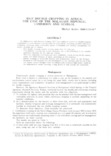in collaboration with National Centers, IRAT has conducted several rice double cropping experiments in some African countries since the early sixties. Assuming excellent cultivation conditions, including water availability, proper fertilization and weeding management, the results obtained are as follows:
- Rice double cropping system ensures more than 10 t/ha/year;
Two different varieties are usually necessary, due to the differences in the weather conditions between the dry and wet season;
- The most important constraints are water availability, mostly during the dry season, weeds and either diseases or pests, depending on the locations;
- Double cropping is technically feasible and economically sound for the farmers;
- Research is still necessary for the development of new varieties and the use of low cost inputs (mostly nitrogen which is indispensable to ensure high yields), based on the experimental results covering a long period of time (except for Cameroon).

